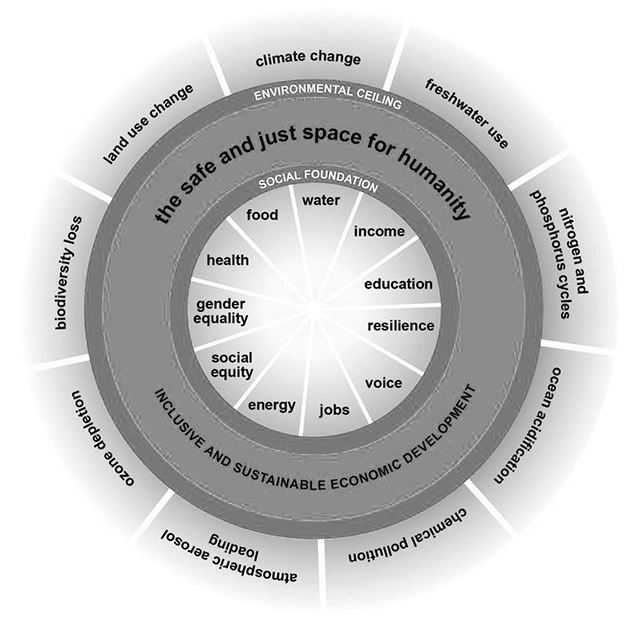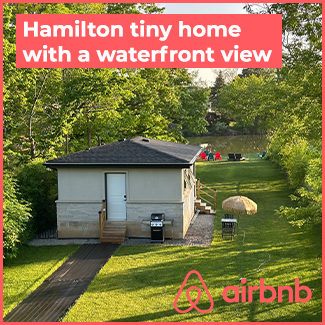
Can We Live Within The Doughnut?
- George Sweetman
- 02 Nov 2015

In February 2012, Oxfam prepared a discussion paper that asked the question “can we live within the doughnut?” The paper identified the challenges of working within the limits of the planet’s resources to achieve prosperity for all. As a resident of Hamilton, with Hamilton being the birthplace of Tim Hortons, the question resonated with me. I have been considering whether it is possible for the City of Hamilton to “live within the doughnut”.
As shown in the graphic, the doughnut is “the safe and just space for humanity” between the social foundation and the environmental ceiling.
Upon reviewing the components of the social foundation and the environmental ceiling, I was struck by the extent to which organizations in Hamilton such as The Mustard Seed Co-operative, Environment Hamilton, Neighbour to Neighbour, Indwell — the list goes on — are currently working on these issues. It occurred to me that it would be powerful to bring these organizations together to educate each other on what is being done to address these environmental and humanitarian challenges. It would be encouraging, uplifting, and energizing to hear people speak passionately about the good work their organizations are doing.
Using the “doughnut” framework provided by Oxfam, we could collectively plot each organization on the doughnut and develop a complete picture of how our community is addressing its needs. This would allow us to see how our actions are contributing to the collective good.
Too often the scope of social and environmental problems can seem overwhelming. It is difficult to see how our work on one element of the problem will make a difference. However, if we can see how our work fits into the big picture, if we can know that the other elements are also being addressed, we can begin to believe that change is coming. Collectively, we can grow the doughnut to ensure that Hamilton’s “safe and just space” is big enough for everyone.
Here are some examples of people and groups who are working to address the social foundation and environmental ceiling our Hamilton doughnut:
THE MUSTARD SEED CO-OP
By Emma Cubitt
———————————
The Mustard Seed Co-op is Hamilton’s only community-owned grocery store. The bountiful selec- tion of local and wholesome food on our shelves does more than feed our customers — it nurtures community and our relationship with the food we eat.
The Mustard Seed represents over 2,000 member-households who are committed to four founding values: improving our health, local economy, environment, and community. This aligns with the Oxfam social foundations that encompass food, voice, jobs, education, and resilience.
The food part is clear: we source wholesome, affordable foods from producers from Hamilton and other parts of Ontario. We build relationships with our producers to better understand how the food they produce impacts their households, community, and land. With over two-thirds of our products made and grown in Ontario, we know where our food comes from and how we’re helping build our region’s food-resilience.
A co-operative business is democratic — one member, one vote, rather than based on level of economic investment. As such, our members’ voices shape our development, rather than share-holder interests. As the food system becomes increasingly consolidated, our co-op suggests that local citizens can regain a voice by working together. And with almost one per cent of Hamilton households now members, our voice is growing.
The co-op has created 15 living-wage jobs, while offering a wide range of education sessions on food preparation, environment, and agricultural topics. As we grow, we’re exploring further ways to build a resilient, sustainable economy and environment centred on healthy food and community. Everyone is welcome at the Mustard Seed Co-op. Together, we can give our people power and our land a voice.
NEIGHBOUR TO NEIGHBOUR
By Mary Palka
———————————
Neighbour to Neighbour’s work with the Community Garden Network and partners throughout the city focuses on initiating conversations on land use where open space could be used for a community garden. Not only does it put to use a piece of land that was previously sitting empty, probably being sprayed with harmful chemicals to keep grass looking green, community gardens yield food for families, allows communities to work together to produce something for their own neighbourhood.
Community food programs are also facilitating conversations about food sourcing practices, such as improved sustainability when buying locally.
The moment someone steps into N2N Centre, they have access to a number of resources that help “move the needle”. Not only can they receiving food to help with the immediate need, they can also receive counseling on an individual basis that will direct them to further education, training or other supports that will help them build some sustainability in their lives. The community health bus is just an example of one of the many programs offered by N2N that is supporting the continued health of our neighbours.
N2N also invests in a reading tutor program for children in grades 1 to 3. Helping kids succeed in school and fostering a love of learning will keep them engaged in school early on, and they will be ready for high school when the time comes.
With the announcement of a community food centre coming to Hamilton through Neighbour to Neighbour, we will now have a provincial and national voice for many of these conversations.
MARKET FRESH
Working on food, social equity, jobs, resilience
By Kevin Somers
———————————
Market Fresh Produce at 707 Barton Street East is a fruit and vegetable store with a pay-it-forward concept. This is a project everyone can get behind — it’s already going, there’s no burden to the tax-payer, and it has unlimited potential to do good.
The Code Red area in which Market Fresh is located is littered with fast food, junk food, and convenience food, but the neighbourhood was dying for raw fruits and vegetables. Nicknamed “the food desert,” surveys showed, overwhelmingly, the locals wanted easier access to fresh produce. So, in the heart of the desert, up sprung Market Fresh with one thousand square feet of good produce.
Market Fresh’s Jim Beattie says, “There’s not a huge silver bullet to fix neighbourhoods. It takes a lot people doing their thing; guys like Graham Crawford and Dave Kuruc (two James Street entrepreneurs).”
The business model, like the store, is perfectly uncomplicated. A wholesale business, Market Fresh needs warehousing, so they use some of the space benevolently. As well as their regular duties, the Market Fresh team has taken on running the retail aspect. The goal is for the store to sustain itself and employ locals
It has a beautifully simplistic pay-it-forward option, as well. Shoppers who have a little extra can purchase tags, which others are able use as cash to buy quality produce. Simple. Beautiful. Jim said the idea for a pay-it-forward outlet came from a client, 541 Barton, which is fantastic restaurant just down the street
“We know produce,” Jim said of the Market Fresh crew. “We’re passionate about it. We wanted to use the business to do good, so we started thinking.” “This is an experimental model,” Jim said of the Market Fresh outlet. “The neighbourhood has to support it. If this is viable, we’d like to have little pocket stores around Hamilton. Every area should have a ‘James North’ revival. We’re trying to do our part.”
TRY IT YOURSELF!
Mustard Seed Co-Op
Comments 0
There are no comments


Add comment